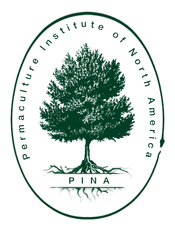On Demand webinar: Learn how to turn a permaculture certification into a career. Access it here!
What is permaculture?
Permaculture design is a whole-systems design approach to developing sustainable human settlements.
Rooted in horticulture and agriculture, Permaculture design also touches on regional planning, land stewardship, ecology, food production, animal husbandry, technology, and water management.
Our online, instructor-led Permaculture Design Courses (PDCs) teach the design process and lay the foundation for a lifelong study and path in Permaculture.
The collaborative, academically rigorous curriculum guides you to complete a design for a regenerative landscape design with intensive instructor feedback and one-on-one interaction to help with every step along the way.
The courses include:
We offer two different Permaculture Design Courses. The 10 week PDC follows the internationally recognized PDC curriculum and results in a high-quality Site Design Portfolio.
You will get personalized written or video feedback on your design progress from a professional Permaculture designer each week.
We also offer an expanded version of the traditional Permaculture Design course: the 20-week PDC-PRO.
This program offers an expanded design portfolio, more detailed assignments, and live meetings with individualized mentorship and consultation on class design projects.
We typically offer both courses four times a year, starting in June, September, January and April.
PDC: This course is designed for anyone who is interested in learning more about sustainability through the lens of Permaculture Design. This course includes all the curriculum required for the internationally recognized Permaculture Design certificate.
PDC PRO: For the person wanting to gain the skills of a professional designer. This course includes all the curriculum required for the internationally recognized certificate.
Our Permaculture courses were developed by OSU instructors Andrew Millison and Marisha Auerbach.
Today the teaching team (see bio's below) includes instructors from around the world who have benefited thousands of students by sharing deep insight and 20+ years of experiences in Permaculture design in diverse regions and climate zones.
Successful completion of either the PDC or PDC-PRO course results in a Permaculture Design Certificate issued by the Permaculture Institute of North America.

By the end of this course, you will be able to:
You will have a chance to learn:
You will engage with peers through the PDC's program discussion boards, where you can receive and provide feedback and follow each project’s progress. You will learn from peers by sharing your own permaculture design plan and viewing other projects from diverse climates and environments.
Previous participants have come from locations all around the world, and have created design plans for sites that ranged in size from urban balconies to 100-acre ranches. View examples of previous student projects.
Due to our international online learning community, there are no set meeting times for the PDC and all of the content is prerecorded. For the PDC PRO, small groups meetings will be organized by time zone.
We are excited to work with a variety of learners, and we guarantee an education you won't find elsewhere.
In just ten (or twenty) weeks, you will:
Because this program is in-depth and robust, you can expect about 10-15 hours of coursework per week.
By learning one-on-one with Andrew, Marisha and their team, you can avoid common mistakes and receive experienced guidance throughout the process.
This course focuses on completing a Permaculture design for an actual site of your choice. Please review this document that provides guidelines for choosing your design site. It is important to spend some time considering before the start of the course. View examples of previous student projects.
This is a fully online course and requires a certain level of basic computer literacy to be successful. Please review this Required Hardware and Software page to make sure the course is feasible for you.
As part of the course, we use free online programs to do site analysis and create design reports. We provide instructions within the course, but familiarity with these programs prior to the course will enhance your experience and prepare you for the work:
 “I work full-time, so being able to take the course at my own pace was a big factor for me. And even now, I can go back and watch the videos if I have questions... I want to help people grow their own food, and this course gave me the confidence and knowledge to do that.” ~ Linda Nash
“I work full-time, so being able to take the course at my own pace was a big factor for me. And even now, I can go back and watch the videos if I have questions... I want to help people grow their own food, and this course gave me the confidence and knowledge to do that.” ~ Linda Nash
 “To have somebody that has that kind of experience and knowledge critiquing my design was priceless. I hope I have conveyed how rich my current life is, absolutely without question because of what I have gleaned from Andrew in that class." ~ Marianne Cicala
“To have somebody that has that kind of experience and knowledge critiquing my design was priceless. I hope I have conveyed how rich my current life is, absolutely without question because of what I have gleaned from Andrew in that class." ~ Marianne Cicala
A very limited number of scholarships are available. Preference is given to students who live in countries where the economy makes it very difficult to pay US prices, as well as those from disadvantaged communities.
Scholarship applicants must have completed the Introduction to Permaculture Course and are required to upload their completed workbook.
Scholarship applications are due five weeks before the start of the next course. You will receive notification at least three weeks before the start of the next course.
You can complete the Permaculture Design Course Scholarship application here.
Scholarships for the PDC PRO course are also available. Preference is given to students who live in countries where the economy makes it very difficult to pay US prices, as well as those from disadvantaged communities.
Scholarship applicants must have completed the Introduction to Permaculture Course and are required to upload their completed workbook.
Scholarship applications are due five weeks before the start of the next course. You will receive notification at least three weeks before the start of the next course. Please note that the PDC PRO is a 20-week course.
You can complete the PDC PRO Scholarship application here.
 “The content in OSU programs far exceeded my expectations. Often I feel I received my money's worth in the first part of multi- part courses. OSU is a high quality experience and I absolutely recommend OSU for your educational needs. Love Andrew Millison’s courses. I’m enjoying my courses and glued to the content and highly respect the instructors for their expertise and vast knowledge!” ~ Toni Tayor
“The content in OSU programs far exceeded my expectations. Often I feel I received my money's worth in the first part of multi- part courses. OSU is a high quality experience and I absolutely recommend OSU for your educational needs. Love Andrew Millison’s courses. I’m enjoying my courses and glued to the content and highly respect the instructors for their expertise and vast knowledge!” ~ Toni Tayor
 “An amazing first step when wanting to learn about permaculture design and how to take sites towards being more sustianable and well thought out.” ~ Sydney Toole
“An amazing first step when wanting to learn about permaculture design and how to take sites towards being more sustianable and well thought out.” ~ Sydney Toole
Re-Enrollment
PDC: $250 ($70 transfer fee, $180 re-enrollment course fee)
PDC PRO: $450 ($70 transfer fee, $380 re-enrollment course fee)
You may only transfer once and are only eligible to transfer to a new section of your original course.
Upgrade from PDC to PRO
$500: You must request an upgrade within the first two weeks of starting PDC.
*Does not apply to PDC re-enrollments.
Course Access
You will have access to your course for two years from the end date of the course.
This course is a collaboration between Oregon State University College of Agriculture and Oregon State University Professional and Continuing Education.
After successful completion of the Permaculture Design Certificate Online, consider enrolling in one of our advanced courses:
 Enjoy peace of mind with our risk-free guarantee on online instructor-led courses.
Enjoy peace of mind with our risk-free guarantee on online instructor-led courses. No. What sets OSU's Permaculture Design Certificate apart is that it's taught online by industry experts with personalized attention and feedback and access to an online community. So, rather than spending time and money on traveling, you get to learn directly from the experts without leaving your home. By the end of the program, you'll have a working Permaculture design that you can implement.
Oregon State University's Permaculture Design Certificate includes all the curriculum required for the internationally recognized certificate. Upon successful completion of the program, you will receive a digital certificate of completion from Oregon State University that you can easily print out. Though the program is robust, it's non-credit, so it's not possible to transfer it towards college credits.
"This course furthered my ecological knowledge and allowed me to pursue an amazing fellowship opportunity! The instructors were very responsive and I really appreciated the feedback I received each week from fellow classmates. I loved this program and highly recommend it to others that are interested!”
“OSU PACE programs have allowed me to grow professionally and expand my knowledge in areas that I was passionate about but didn't yet have much experience with. I'm grateful for the opportunities it provided and doors that it opened me.”
“It was wonderful to have our work evaluated by an experienced, regionally appropriate Permaculture designer. I never would have done some of the exercises on my own without prompting, and I got a lot out of it. It was gratifying to have such personal work affirmed in many ways, but I also learned about my weaknesses as a designer and where I can improve, and I mean that as a compliment to the program!”
“The permaculture design course is well designed, with recorded lectures, lots of reading, and learning by doing the weekly assignments. This culminates with a comprehensive plan for your land. It’s a lot of work, especially learning the computer skills necessary for doing the weekly assignments. And well worth it! My husband and I are starting a small farm. The permaculture course taught me so much, providing a solid foundation. The class was outstanding. The component I would have liked would have been a discussion group with our TA and cohorts.”
"I am loving how each week I am having so many moments where I think…”I never thought of that. It’s a great idea that could work.” And everywhere I go I am observing so many possibilities for change. I feel like I am at the beginning of my college experience, instead of 20 plus years past it. There are many ideas I want to incorporate as part of my permaculture design, but my challenge is having a small design site and packing it all in."
"A lot of information covered! This course provided me with a better understanding of where I needed to focus on further studies. Excellent course content!"
"WOW awesome job. Very intense but very rewarding. A lot of work went into creating the course and managing the course and it shows. Thanks!"
"I loved, LOVED this class so much. I’ve truly gained so much knowledge and ambition through each week. I’m moving onto a farm from the city (apartment where I currently reside) in two weeks with a group of 4 people; we are all likeminded city kids with common experiences and working knowledge of farming and diy lifestyles. I have been left in charge of designing the layout of the land and the gardens, so this is my next HUGE endeavor. We are planning on getting chickens, goats, and we already have 3 beehives. We are even going to be installing rain barrels. I feel like I have a lot of good ideas brought forth from you and Marisha that I can share with my roommates and put into play what I’ve learned from this course. So, thank you for an excellent semester."
"Andrew and all of his instructors were incredible. They are extremely hardworking, knowledgeable, and kind, and each put in a significant amount of effort to help each involved student understand, learn, and therefore grow. I was very impressed with the research that has gone into creating and maintaining this course and I highly recommend it to anyone willing to put in the effort. I end this course feeling inspired, more knowledgeable, and ready to take on the principles I learned about. I'm genuinely grateful, thank you!"
Andrew Millison has been studying, designing, building, and teaching about Permaculture systems since 1996 and is an instructor in the Department of Horticulture at Oregon State University. He instructs Advanced Permaculture Courses in Teaching, and has guest instructed for many Permaculture courses throughout the Western US.
Marisha Auerbach is an internationally recognized permaculture educator, designer and speaker based in Portland, OR. She has been practicing, studying and teaching permaculture for over twenty years in the Pacific Northwest. Marisha has worked in diverse environments from the humid temperate climate to the tropical rainforest in Belize to the arid landscapes of Colorado and Montana. Her international experience includes work in Belize, Haiti, Nicaragua and Vietnam.
Tao Orion has been working in permaculture for over 15 years and specializes in permaculture designs on the West Coast. She specializes in restoration, systems thinking and design, homesteading and small farm management, forestry, and ethnoecology and ethnobotany. She is the author of Beyond the War on Invasive Species: A Permaculture Approach to Ecosystem Restoration.
Devon Bonady has been practicing and teaching permaculture for 20 years. She has worked in the Pacific Northwest and, most recently, in the Northeast US. She specializes in plant propagation, edible landscape design, perennial vegetables, fruiting shrubs, and historical and contemporary Northwest ethnobotany.
Javan Kerby Bernankevitch has worked in the U.S., Canada, Kenya, Uganda, Cuba and remote Mongolia. He specializes in geomorphic design, rainwater harvesting, perennial systems, and business evaluation and design. Javan is a consulting editor for Permaculture Magazine United Kingdom and North America and is a writer for Urban Farm, Communities and Permaculture Magazine.
Neil has a passion for enriching bioregions and cultivating ecologies. He holds degrees in Biology and Environmental Science. He is the owner of RT Permaculture, an ecological design and education firm specializing in effective and regenerative landscapes. He has been part of the OSU Permaculture Teaching Team since 2014 and has over a decade of experience in ecological design and watershed restoration, Neil brings a range of skills to his projects including horticulture, irrigation, water harvesting, erosion control, and small scale farm development. Neil’s projects commonly include integrated water harvesting agroforestry systems, homestead production gardens with season extension, medicinal pollinator habitats, and ecological restoration.
Jamie Wallace has worked primarily in the Vancouver area in British Columbia, Canada. He specializes in permaculture landscape design for urban, acreage and commercial properties; installation and project management services; rainwater harvesting design and installation; and plant propagation.
Kelda Miller has worked in the Pacific Northwest, Oklahoma, Haiti, Cuba and Hawaii. She specializes in creating regional permaculture networks and events; permaculture planning applied to urban walkability planning and municipal codes; anti-oppression work related to permaculture; and land-share gardening.
Karen Taylor has been working in permaculture for over 20 years and has worked in Oregon, Arizona, New Mexico and Northern California. She specializes in rainwater harvesting design and installation; greywater systems design and installation; alternative technologies; social forestry; holistic orchard care; surveying and homesteading; healthy home design; course and event organizing; and mentoring and coaching.
JR Morgan has done permaculture work in Oregon, Zimbabwe and Puerto Rico. He specializes in organic gardening and food production, plant care, water harvesting, and urban permaculture. He also has extensive knowledge and experience as an educator, in eco landscaping, wood working and environmental justice.
Sunshine Rose Claymore is a mother from Standing Rock Reservation. A graduate from Sitting Bull College with a Bachelor’s in Environmental Science, there has been a drive to better understand natural processes on our planet. Recently taking the position of Permaculture and Food Systems Coordinator for NDSU and Regenerative Land Management Coordinator with Earth Activist Training, environmental education along with systems design has been a long time passion.
